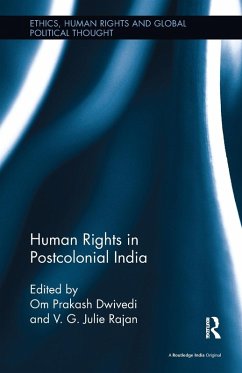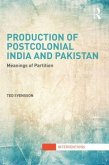Human Rights in Postcolonial India
Herausgeber: Dwivedi, Om Prakash; Rajan, V. G. Julie
Human Rights in Postcolonial India
Herausgeber: Dwivedi, Om Prakash; Rajan, V. G. Julie
- Broschiertes Buch
- Merkliste
- Auf die Merkliste
- Bewerten Bewerten
- Teilen
- Produkt teilen
- Produkterinnerung
- Produkterinnerung
This volume looks at human rights in independent India through frameworks comparable to those in other postcolonial nations in the Global South. It examines wide ranging issues that need immediate attention such as those related to disability, violence, torture, education, LGBT, neoliberalism, and social justice.
Andere Kunden interessierten sich auch für
![Human Rights in Postcolonial India Human Rights in Postcolonial India]() Human Rights in Postcolonial India211,99 €
Human Rights in Postcolonial India211,99 €![Communism, Subaltern Studies and Postcolonial Theory Communism, Subaltern Studies and Postcolonial Theory]() Nissim MannathukkarenCommunism, Subaltern Studies and Postcolonial Theory201,99 €
Nissim MannathukkarenCommunism, Subaltern Studies and Postcolonial Theory201,99 €![The Postcolonial Age of Migration The Postcolonial Age of Migration]() Ranabir SamaddarThe Postcolonial Age of Migration201,99 €
Ranabir SamaddarThe Postcolonial Age of Migration201,99 €![Communism, Subaltern Studies and Postcolonial Theory Communism, Subaltern Studies and Postcolonial Theory]() Nissim MannathukkarenCommunism, Subaltern Studies and Postcolonial Theory67,99 €
Nissim MannathukkarenCommunism, Subaltern Studies and Postcolonial Theory67,99 €![Production of Postcolonial India and Pakistan Production of Postcolonial India and Pakistan]() Ted SvenssonProduction of Postcolonial India and Pakistan65,99 €
Ted SvenssonProduction of Postcolonial India and Pakistan65,99 €![Religious Beliefs and Knowledge Systems in Africa Religious Beliefs and Knowledge Systems in Africa]() Toyin FalolaReligious Beliefs and Knowledge Systems in Africa154,99 €
Toyin FalolaReligious Beliefs and Knowledge Systems in Africa154,99 €![Postcolonial Intellectuals in Europe Postcolonial Intellectuals in Europe]() Postcolonial Intellectuals in Europe175,99 €
Postcolonial Intellectuals in Europe175,99 €-
-
-
This volume looks at human rights in independent India through frameworks comparable to those in other postcolonial nations in the Global South. It examines wide ranging issues that need immediate attention such as those related to disability, violence, torture, education, LGBT, neoliberalism, and social justice.
Hinweis: Dieser Artikel kann nur an eine deutsche Lieferadresse ausgeliefert werden.
Hinweis: Dieser Artikel kann nur an eine deutsche Lieferadresse ausgeliefert werden.
Produktdetails
- Produktdetails
- Verlag: Routledge India
- Seitenzahl: 346
- Erscheinungstermin: 24. Januar 2018
- Englisch
- Abmessung: 216mm x 140mm x 19mm
- Gewicht: 436g
- ISBN-13: 9781138488427
- ISBN-10: 1138488429
- Artikelnr.: 50905855
- Herstellerkennzeichnung
- Produktsicherheitsverantwortliche/r
- Europaallee 1
- 36244 Bad Hersfeld
- gpsr@libri.de
- Verlag: Routledge India
- Seitenzahl: 346
- Erscheinungstermin: 24. Januar 2018
- Englisch
- Abmessung: 216mm x 140mm x 19mm
- Gewicht: 436g
- ISBN-13: 9781138488427
- ISBN-10: 1138488429
- Artikelnr.: 50905855
- Herstellerkennzeichnung
- Produktsicherheitsverantwortliche/r
- Europaallee 1
- 36244 Bad Hersfeld
- gpsr@libri.de
Om Prakash Dwivedi is Assistant Professor in English at Shri Ramswaroop Memorial University, Lucknow, India. He has co-authored Re-Orientalism and Indian Writing in English (2014) and co-edited Indian Writing in English and the Global Literary Market (2014). Dwivedi is also the editor of Tracing the New Indian Diaspora (2014). V. G. Julie Rajan is Assistant Professor in the Department of Women's and Gender Studies at Rutgers University, USA. She has lectured in the Program in Gender, Sexuality, and Women's Studies at the University of Pennsylvania, as well as on political violence and women's human rights for the Institute for the Study of Human Rights at Columbia University, USA. Her research interests include women and militarism, violence against women, terrorism and human rights. Rajan's monographs include Women Suicide Bombers: Narratives of Violence (2011) and Al Qaeda's Global Crisis: The Islamic State, Takfir, and the Genocide of Muslims (2015). Among her edited collections are Violence and Gender in the Globalized World: The Intimate and the Extimate (2008, 2015) and Myth and Violence in the Contemporary Female Text: New Cassandras (2011). Rajan's current research concerns genocide, gendercide and femicide in the territories claimed by The Islamic State globally.
The State of Human Rights in Postcolonial India, 1947-2014: Postcolonial
and Anti-Colonial Terrains Part I. Education and Social Value 1. The
Paradox and Promise of Children's Rights in Indian Schools 2. Education as
Empowerment? Gender and the Human Right to Education in Postcolonial India
Part II. The Body and Autonomy 3. Truth-Telling Techniques: The Aditi
Sharma Case and the Implications for Human Rights in India 4. Experiencing
Torture and Human Rights Violations: Reflections on Self-Experience 5.
Writing Disability and Rights in Naseema Part III. Legal Subjectivity and
Civil Rights 6. Reflections on the Use of Fatal Force by the Indian State:
Colonial and Postcolonial 7. The Subject of Rights: Conflict Violence and
Transitional Justice in India 8. Gender, Politics, and Development in Rural
India Part IV. Violence, Women, and the Girl-Child 9. On a Different
Footing: Has "Nirbhaya" Turned India Around? 10. Human Dignity and Social
Justice: Locating Agency in Dalit Women in the Pudukkottai District of
Tamil Nadu, India Part V. Negotiating Globalization and Capitalism 11.
What's Old Is New: How the West's Neoliberal Reforms Seek to Re-Enslave
India 12. Free to be Gay": Same-Sex Relations in India, Globalized
Homophobia and Globalized Gay Rights
and Anti-Colonial Terrains Part I. Education and Social Value 1. The
Paradox and Promise of Children's Rights in Indian Schools 2. Education as
Empowerment? Gender and the Human Right to Education in Postcolonial India
Part II. The Body and Autonomy 3. Truth-Telling Techniques: The Aditi
Sharma Case and the Implications for Human Rights in India 4. Experiencing
Torture and Human Rights Violations: Reflections on Self-Experience 5.
Writing Disability and Rights in Naseema Part III. Legal Subjectivity and
Civil Rights 6. Reflections on the Use of Fatal Force by the Indian State:
Colonial and Postcolonial 7. The Subject of Rights: Conflict Violence and
Transitional Justice in India 8. Gender, Politics, and Development in Rural
India Part IV. Violence, Women, and the Girl-Child 9. On a Different
Footing: Has "Nirbhaya" Turned India Around? 10. Human Dignity and Social
Justice: Locating Agency in Dalit Women in the Pudukkottai District of
Tamil Nadu, India Part V. Negotiating Globalization and Capitalism 11.
What's Old Is New: How the West's Neoliberal Reforms Seek to Re-Enslave
India 12. Free to be Gay": Same-Sex Relations in India, Globalized
Homophobia and Globalized Gay Rights
The State of Human Rights in Postcolonial India, 1947-2014: Postcolonial
and Anti-Colonial Terrains Part I. Education and Social Value 1. The
Paradox and Promise of Children's Rights in Indian Schools 2. Education as
Empowerment? Gender and the Human Right to Education in Postcolonial India
Part II. The Body and Autonomy 3. Truth-Telling Techniques: The Aditi
Sharma Case and the Implications for Human Rights in India 4. Experiencing
Torture and Human Rights Violations: Reflections on Self-Experience 5.
Writing Disability and Rights in Naseema Part III. Legal Subjectivity and
Civil Rights 6. Reflections on the Use of Fatal Force by the Indian State:
Colonial and Postcolonial 7. The Subject of Rights: Conflict Violence and
Transitional Justice in India 8. Gender, Politics, and Development in Rural
India Part IV. Violence, Women, and the Girl-Child 9. On a Different
Footing: Has "Nirbhaya" Turned India Around? 10. Human Dignity and Social
Justice: Locating Agency in Dalit Women in the Pudukkottai District of
Tamil Nadu, India Part V. Negotiating Globalization and Capitalism 11.
What's Old Is New: How the West's Neoliberal Reforms Seek to Re-Enslave
India 12. Free to be Gay": Same-Sex Relations in India, Globalized
Homophobia and Globalized Gay Rights
and Anti-Colonial Terrains Part I. Education and Social Value 1. The
Paradox and Promise of Children's Rights in Indian Schools 2. Education as
Empowerment? Gender and the Human Right to Education in Postcolonial India
Part II. The Body and Autonomy 3. Truth-Telling Techniques: The Aditi
Sharma Case and the Implications for Human Rights in India 4. Experiencing
Torture and Human Rights Violations: Reflections on Self-Experience 5.
Writing Disability and Rights in Naseema Part III. Legal Subjectivity and
Civil Rights 6. Reflections on the Use of Fatal Force by the Indian State:
Colonial and Postcolonial 7. The Subject of Rights: Conflict Violence and
Transitional Justice in India 8. Gender, Politics, and Development in Rural
India Part IV. Violence, Women, and the Girl-Child 9. On a Different
Footing: Has "Nirbhaya" Turned India Around? 10. Human Dignity and Social
Justice: Locating Agency in Dalit Women in the Pudukkottai District of
Tamil Nadu, India Part V. Negotiating Globalization and Capitalism 11.
What's Old Is New: How the West's Neoliberal Reforms Seek to Re-Enslave
India 12. Free to be Gay": Same-Sex Relations in India, Globalized
Homophobia and Globalized Gay Rights








